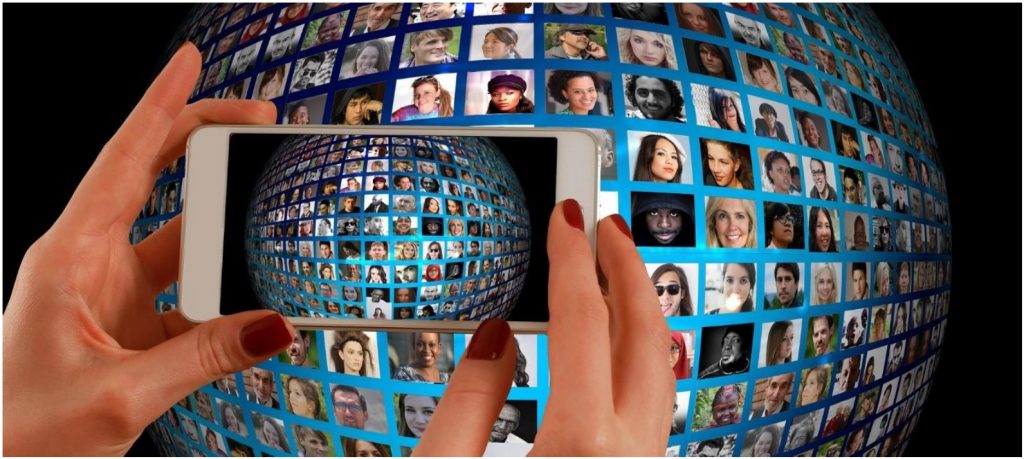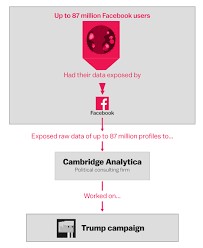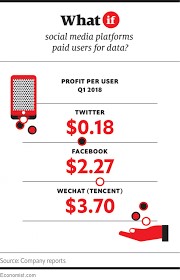Jaakko Dickman
This blog post was produced as part of the course “Social Media, Ideologies, and Ethics in the United States” at the University of Turku.
Is Facebook
simply a platform that neutrally mediates decentralized information created by
its users or is it something closer to a publishing company? This issue has
been central to the debate on the need to regulate Facebook and other social
networking sites.
The debate
has further intensified after the reported Russian interference in the 2016 U.S.
Presidential Election and after the live streaming of the Christchurch mosque
shootings. Actor-comedian Sacha Baron Cohen is the latest to criticize Facebook
and offer his thoughts on the issue.
In his
award speech for the ADL International Leadership Award, Cohen strongly
criticized social networking sites (SNSs) for compromising democratic ideals
and promoting hate and violence. He stated that “on the internet, everything
can appear equally legitimate” and that this is dismantling our understanding
of shared objective facts that are fundamental to a functioning democracy.
Cohen concluded his speech by declaring that “it is time to finally call these
companies what they really are: largest publishers in history.”[i]
At the
heart of Cohen’s speech is the idea that SNSs “should abide by basic standards
and practices,”[ii]
as do traditional media outlets such as newspapers and TV news. Thus, they
should be considered as publishers. To this day, SNSs have evaded
responsibility over their content by stating that they are simply platforms that
mediate content and thus not liable for the content they host. This indemnity
is solidified by the US Communications Act of 1996, which gave an almost
complete autonomy for SNSs to regulate themselves (Flew & al 2019, 38).
However, one could argue that the nature of networked communication has changed so drastically that the new SNSs have outgrown the legislation. Furthermore, the growing interference and curatorial work done by the SNSs has made their ‘neutral platform’ nature questionable.
It is
obvious that Facebook, among other SNSs, is not a neutral mediator of networked
communication. One of the clearest examples of this came in 2016 when Facebook’s
“Trending Review Guidelines” were leaked to the press. The guidelines revealed
how Facebook’s news operation is perpetrated by human intervention similar to
traditional media organizations.[iii]
Still, we have seen that the self-regulative practices of SNSs have not been
effective enough to tackle the spreading of violence, hate speech, and
political interference.
Without acknowledging the new pressures to
regulate these sites in a new cultural, political, societal, and technological
environment, these companies will not be held accountable for their
shortcomings. So, what is holding us back from insisting that these sites are,
in fact, publishers of content and from enforcing governmental regulation on
them?
Nowadays,
when social media companies are operating globally, nation-specific regulation
might cause SNSs such as Facebook to become scattered, with different content
available in different parts of the world. Flew, Martin, and Suzor state that
this type of a “global Splinternet” might have a negative impact on the free
flow of information that has epitomized the period after mid-1990s (Flew &
al., 46). As asserted by the CEO of Facebook Mark Zuckerberg in his speech at
Georgetown University, social media has become “the Fifth Estate” that allows
people all over the world to express themselves.[iv]
The power to give voice to people living under brutal political regimes is a
feature that we do not want to take away from SNSs.
Presently,
the biggest internet companies are regulating the flow of information unelected
and without accountability. According to Cohen, this constitutes ideological
imperialism.[v] The
more SNSs take part in “monitoring, regulating and deleting content” the more
dire is the need for public accountability (Flew & al., 45). However,
instead of traditional nation-specific legislature, the ability to regulate
this new digital environment seems to call for active involvement of global
regulative bodies. Nevertheless, the new role of SNSs and their power to
dictate the flow of information requires new regulative approaches and ideas as
their counterforce.
Bibliography:
Anti-Defamation
League YouTube, ADL International Leadership Award Presented to Sacha Baron
Cohen at Never Is Now 2019, <https://www.youtube.com/watch?v=ymaWq5yZIYM&t=24s> (Accessed Dec 8th 2019)
Flew,
Terry, Martin, Fiona, & Suzor, Nicolas (2019) “Internet Regulation As
Media Policy: Rethinking the Question of Digital Communication Platform
Governance.” Journal of Digital Media & Policy 10, no. 1: 33, 33–50.
Thielman,
Sam (2016) ”Facebook news selection is in hands
of editors not algorithms, documents show.” The Guardian. <https://www.theguardian.com/technology/2016/may/12/facebook-trending-news-leaked-documents-editor-guidelines> (Accessed Dec 8th 2019)
Washington
Post YouTube, Watch live: Facebook CEO Zuckerberg speaks at Georgetown
University, <https://www.youtube.com/watch?v=2MTpd7YOnyU&t=2777s> (Accessed Dec 8th 2019)
[i] https://www.youtube.com/watch?v=ymaWq5yZIYM&t=20s
[ii] https://www.youtube.com/watch?v=ymaWq5yZIYM&t=20s
[iii] https://www.theguardian.com/technology/2016/may/12/facebook-trending-news-leaked-documents-editor-guidelines
[iv] https://www.youtube.com/watch?v=2MTpd7YOnyU&t=2777s
[v] https://www.youtube.com/watch?v=ymaWq5yZIYM&t=20s







